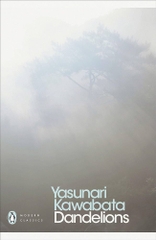A fascinating discovery, Dandelions is Kawabata's final novel, left incomplete when he committed suicide in 1972.
Beautifully spare and deeply strange, Dandelions explores love and madness and consists almost entirely conversations between a woman identified only as Ineko's mother, and Kuno, a young man who loves Ineko and wants to marry her. The two have left Ineko at the Ikuta Clinic, a mental hospital, which she has entered for treatment of somagnosia, a condition that might be called "seizures of body blindness." Although her vision as a whole is unaffected, she periodically becomes unable to see her lover Kuno. Whether this condition actually constitutes madness is a topic of heated discussion between Kuno and Ineko's mother: Kuno believes Ineko's blindness is actually an expression of her love for him, as it is only he, the beloved, she cannot see.
In this tantalizing book, Kawabata explores the incommunicability of desire and carries the art of the novel, where he always suggested more than he stated, into mysterious and strange new realms. Dandelions is the final word of a truly great master, the first Japanese winner of the Nobel Prize.
"Yasunari Kawabata's final novel Dandelions is a treasure, unfinished due to the author's sad death, but remarkably whole and deeply gorgeous. A woman named Ineko is quietly committed to a mental institution in a placid small town, and afterwards, her beloved, Kuno, and Ineko's mother discuss illness, fate, karma, death, suffering, and marriage. There's so much pleasure in these conversations, and the urgency and familial frictions of the present occasion lend a lovely intimate realism to the philosophizing. Inez's affliction, "body blindness," seems part of a curious exploration of trauma. As in Kawabata's Palm of the Hand stories, this novel rings with echoes of past tragedy, and the language is richly pleasurable and imagistic. Certain lines haunt like poetic refrains: "Married couples can accommodate all kinds of peculiar things," "A bell isn't a body," and "To enter the Buddha world is easy, to enter the world of demons is difficult.""
― Gini Balibrera, Literati Bookstore
"Kawabata's novels are among the most affecting and original works of our time."
― New York Times Book Review
"A novel about absences, the near impossibility of human connection, the imperfect yet overpowering nature of memory, and the shortcomings of sight. Dandelions intrigues as an unfinished work."
― Will Harrison, The Hudson Review
"If we read Dandelions not as an unfinished masterpiece but as a work in dialogue with the themes of love, desire, and the language beyond language, it feels not broken off but rather open to possibility, trembling with the potential for interpretation. Rather than longing for what lies beyond the final page, we can turn our attention to what has already been presented, however mysteriously, and consider it from different perspectives, as one turns a faceted crystal under a light."
― Larissa Pham, The Nation
"Yasunari Kawabata’s lusciously peculiar novel Dandelions was unfinished when he took his life in 1972. It’s a story of love and loss and mania, told in sparse, arresting prose."
― The Paris Review, The Paris Review
"Kawabata’s novels are among the most affecting and original works of our time."
― The New York Times Book Review
"There are few other writers who could invoke such a lasting memory of a single image with so few words."
― San Francisco Chronicle
"A literary habitat like no other―quietly devastating fiction. Behind a lyrical and understated surface, chaotic passions pulse."
― The Independent (London)


